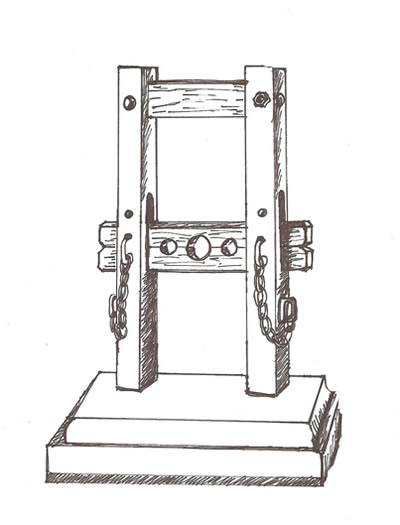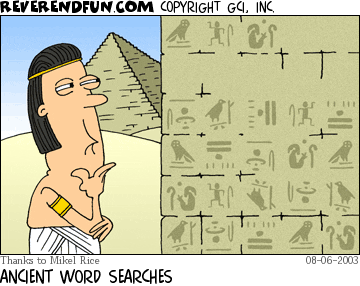How to Draw a Cartoon

Free Graphics

Purchase Products

Artist in Residence

About the Author

Home Page
This is Chapter 3 by Gary Harbo
3. What is a Prophet?
A prophet or prophetess was a man or woman chosen by God to speak for Him and to tell of events in the divine plan. God takes the initiative and selects, summons and sends the prophet. Enoch was the seventh generation from Adam and was probably the first prophet. Moses was the leader that brought the nation of Israel out of Egypt and is recognized as one of the greatest prophets. In Deuteronomy, Moses predicted that many prophets would come to the Jewish people, culminating in the final and greatest of all prophets, the Messiah.
Deuteronomy 18:18 "I will raise up for them a Prophet like you from among their brethren, and will put My words in His mouth, and He shall speak to them all that I command Him."
This long line of prophets in the Old Testament included Enoch, Moses, Isaiah, Jeremiah, Ezekiel, Daniel, Hosea, Amos, Joel, Zechariah, Micah and many others. The Old Testament prophets were forthtellers -- declaring the truth about God -- by being foretellers -- predicting what God will do. So you may ask, “when is a Prophet a Prophet?” Let’s consult the Bible.
Deuteronomy 18:21 "How shall we know the word which the LORD has not spoken?"
Mosses replied:
Deuteronomy 18:22 "...when a prophet speaks in the name of the LORD, if the thing does not happen or come to pass, that is the thing which the LORD has not spoken;”"
A prophet normally told people the cause of their current problems. Trouble is, a prophet had to be right 100% of the time. Anything less would doom the prophet to death by stoning. (This was not a profession for the faint of heart. The current crop of weather forecasters need not apply.) In fact, Jeremiah’s predictions made Pashur, one of the religious leaders of the time, so furious that Pashur beat him and put him in stocks (Jeremiah 20:2). Wouldn’t this kind of feedback impact what you would be willing to tell and who you would want to tell it to? Logic would say yes, however if you are inspired by the Holy Spirit, then the LORD gives you a bigger perspective.

Jeremiah was a great prophet and lived prior to and throughout the time frame of the fall of Judah at the hands of the Babylonian empire in 586 BC. Jeremiah told his people that Judah, the southern kingdom of Israel, would be invaded and destroyed by Nebuchadnezzar, the King of Babylon (Jeremiah 25:9). He then foretold that any Jewish survivors would be carried off to Babylon as slaves, and he even told them that they would be there for seventy years (Jeremiah 25:11).
Archaeology and ancient history confirm the fulfillment of Jeremiah’s prophecy. The Jewish people were captured and carted off to Babylon. While Jeremiah was exiled to Egypt the rest of his people were forcibly marched to Babylon. It is almost impossible to imagine the pain and suffering that the nation of Judah felt during these times. So, why did the Jewish people preserve the messages of Jeremiah, which were of defeat and captivity and indictment against them? They dared not destroy what they believed were God’s words. They knew the power of God’s word. (If only we had as much fear and respect for the power of our Creator.)
The benchmark to measure all other prophets was Isaiah, the son of Amoz. In my mind, he was the superstar of prophets. His predictions were made over a sixty-year span (740-680 B.C.). Nobody came close to the sheer quantity, the clarity of the details and the amazing boldness of the prophecies that he stated. I’ve read Isaiah many times, and I still discover awesome prophecies every time I jump into it. Here’s just a few gems, concerning the Jewish people, to help you ascertain the sheer weight of his word.
Short term prediction:
In about 710 BC a mighty Assyrian army, numbering in the thousands and commanded by the vicious King Sennacherib, besieged Jerusalem (Isaiah 36:1, 2). The Jewish nation was shaken. The Jewish King Hezekiah sent out a delegation to Isaiah to plead with him to pray to Jehovah, the God of Israel. God responded through Isaiah by predicting that a rumor would reach King Sennacherib of internal trouble in his kingdom and this nasty King would return without attacking Jerusalem. As if this wasn’t bold enough, he threw in a kicker. He also predicted that Sennacherib would be assassinated in his own land. That’s right. Not only is he going to turn tail and head home without a fight, but he will be assassinated when he gets there (Isaiah 37:7). Now Sennacherib was in the driver’s seat. His army was vastly superior to King Hezekiah’s, so why would he want to head home? To bring the message into a sense of clarity, the angel of the LORD went forth one night and struck down 185,000 in the Assyrian camp. After the slaughter of 185,000 of his finest soldiers, King Sennacherib’s decided, in a brilliant military tactical decision mind you, that it wasn’t a such good idea to carry on in his fight against Israel’s LORD. He quickly decided that his Jewish tour was over and that it was time to make tracks back home. Only a true prophet with the touch of God could make such a statement. Amazingly enough, it happened just as Isaiah had predicted. Jerusalem was spared a certain defeat and (remember that small part about an assassination) King Sennacherib was killed by his own sons after his arrival at home (Isaiah 37:36-38). With family like that who needs enemies? Are you beginning to understand the power of this prophet? This amazing prophesy came true while Isaiah was still alive.

How about a prediction 100 years out:
Like Jeremiah, Isaiah predicted that Babylon would completely destroy Judah and carry away all the treasures of Israel and her Temple. He foretold that the surviving sons of the royal family would be eunuchs in the palace of Babylon. Do you know what an eunuch is? It is a castrated man who is employed as a chamberlain in a palace of the king. Isaiah was predicting that the royal family of Judah would be removed of their private parts and carted away to a foreign land to work as servants in a palace. (If someone gave me this prophecy about my family, I would not be amused.) How could he have been allowed to live after making such a bold prediction concerning the royal family? There is only one answer. The rulers knew he was a Holy Man with the vision of God. They dared not kill him. Sure enough in a little over a hundred years (586 BC) the royal family had new jobs and a lot less testosterone, just as Isaiah had sadly forecast (Isaiah 39:5-7).
Lets try one 150 years out:
Isaiah predicted that the mighty Babylonians, who would decimate the Jewish nation, would themselves be conquered and so completely destroyed by the Medes that Babylon would never be inhabited again (Isaiah 13:17-22). This is an astonishing prediction, because Babylon was one of the seven wonders of the world and was considered impregnable. How could anyone dare predict it’s fall? Yet on October 12, 539 BC, 150 years after Isaiah’s prediction, the Medes and Persians were standing under the towering walls of Babylon listening to a wild Babylonian party on the other side. These walls were 150 feet high and so thick that five chariots could race side-by-side around the top.
“How could this fortress be penetrated?” you might ask. Well, as we all know, where there is a will, there’s a way. The Medes and Persians were cunning and they certainly used their will to create the way. Before they damned the Babylonians, they dammed the Euphrates River, which ran under the Babylonian wall on its flow through the city. Unknown to the Babylonians, while they were celebrating at a drunken royal ball, the Median army marched along the dry river bed and strolled under the wall on their way to conquering the city.
This was the very night that the Babylonian King Belshazzar was enjoying a festive party inside these very same walls. In all his cockiness, he had insisted on using the sacred Jewish Temple goblets as the vessels for his wine. He quickly realized this was a bad choice when he saw the handwriting on the wall. I’m serious, he literally saw a human hand with fingers writing on his wall. The hand was attached to nothing. His face turned pale and his loins literally gave away (i.e. he pooped his pants). That same night Daniel was summoned to decipher the handwriting on the wall (Daniel 5:25-28) and just like that, the Babylonian kingdom fell and was split between the Medes and Persians. It would never be a Babylonian empire again, at least up through today.

We’ll conclude with another prediction nearly 200 years out:
Isaiah predicted that a certain king named Cyrus would see that Jerusalem and the Temple were rebuilt by allowing those who wished to do this work to return to the land of their ancestors (Isaiah 44:28-45:4). That’s right, he actually named names.
Can you guess what happened? Come on, give it a try. Don’t be bashful. Yep, in 539 BC, a certain Persian king who just happened to be named Cyrus, granted royal favor to the Jewish captives left over from Babylon. He actually sent them to Jerusalem with a requisition for materials to rebuild the great Jewish city and Temple (Ezra 1:1-11). He even gave them 5,400 of the original Temple articles such as cups, dishes and bowls made of gold and silver. These had been brought out of the Temple by Nebuchadnezzar. In 515 BC, almost 200 years after this prediction, the Temple was completed.
You may be saying that these predictions have nothing to do with the Messiah. I’ll grant you that point at this stage of the game. Be patient, because that will come soon. These examples demonstrate that when these prophets spoke, kings listened. It is well documented how these predictions came to pass in exact detail as foretold through the prophets. God cannot lie!
Titus 1:2 ...God, who cannot lie...
Hebrew 6:18 ...it is impossible for God to lie...
Now let’s continue.
2 Timothy 3:16 All Scripture is given by inspiration of God...
We can rest assured that the scripture in the Bible will come to pass.
Again, this is the Old Testament. This is where we are going to find Jesus Christ. Long before He arrives in person to save you and me. Sounds like a long shot doesn’t it? Let’s find out just how long of a long shot it was.
Click here if you'd like to read the foreword
Click here if you'd like to read chapter 1
Click here if you'd like to read chapter 2
Click here if you'd like to read chapter 4
Click here if you'd like to read chapter 5
Click here if you'd like to read chapter 6
Click here if you'd like to read chapter 7
Click here if you'd like to read chapter 8
Click here if you'd like to read chapter 9
Click here if you'd like to read chapter 10
Click here if you'd like to read chapter 11